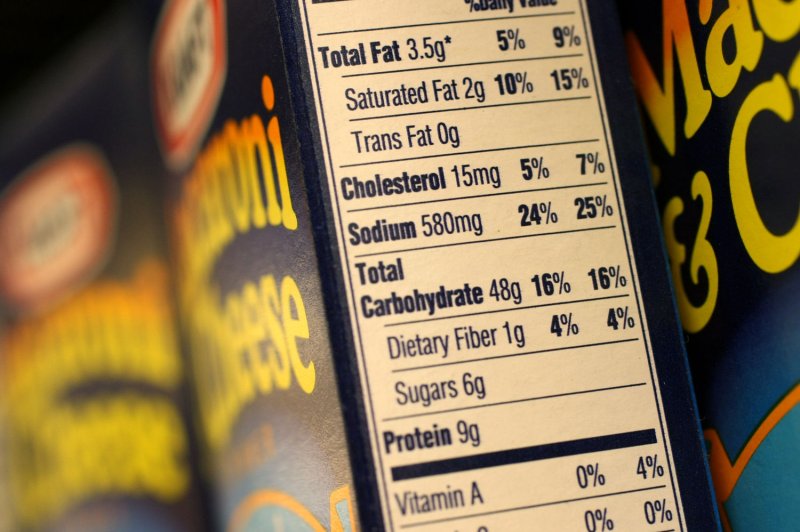A nutrition label is seen on a box of macaroni and cheese at the Westside Market in New York on January 11, 2010. New research shows more than half of all packaged food items contain unhealthy levels of sodium. File Photo by UPI/Monika Graff |
License Photo
WASHINGTON, April 3 (UPI) -- Bostonians wondering why their roads were frozen all winter now have answers -- all the salt was used to make America's most beloved processed foods. CDC researchers recently found more than half of nearly 4,000 packaged foods exceeded recommended sodium levels.
A new study published by the Centers for Disease Control reveals the aisles of U.S. grocery stores to be littered with salt. This reality, researchers say, is why a large reason why Americans have so much trouble meeting the agency's sodium intake recommendations.
According to the CDC, more than 90 percent of Americans exceed the daily sodium limits set by federal nutrition experts. High sodium intake is linked with hypertension, heart disease, diabetes and certain cancers.
"The most important thing for consumers to know is that they should be reading labels, comparing food products, and looking for low or no sodium food options at the grocery store," lead researcher Linda Schieb told ABC News.
If shoppers don't read the labels, the new study proves the odds are against them selecting a food item with a healthy amount of salt.
The study found more than 70 percent of pizza, pasta mixed dishes or meat mixed food items exceeding the sodium-per-serving levels the Food and Drug Administration designates as a "healthy" choice. Some 50 to 70 percent of cold cuts, soups and sandwiches were also found to unhealthy levels of salt.
Across all packaged food items, 50 percent of products failed to meet FDA standards for healthy salt levels.
Nutritionists say the findings aren't all that surprising. While some food manufacturers have tried to reduce the amount of salt in their products, salt acts as a preservative -- an essential component for foods that have to last on the shelves.
The best solution to avoiding a high-salt diet is to avoid processed foods as much as possible, and to only use low-sodium packaged foods as a base. Experts recommend sticking to home-cooked meals, heavy on fruits and vegetables, as much as possible.
But eliminating processed foods can be difficult for people on the run -- managing families, working multiple jobs. That's why, researchers argue, it's important to push food companies for healthier options.
"These data support recent findings that suggest that meeting sodium recommendations may be difficult in the current food environment," study authors concluded.















